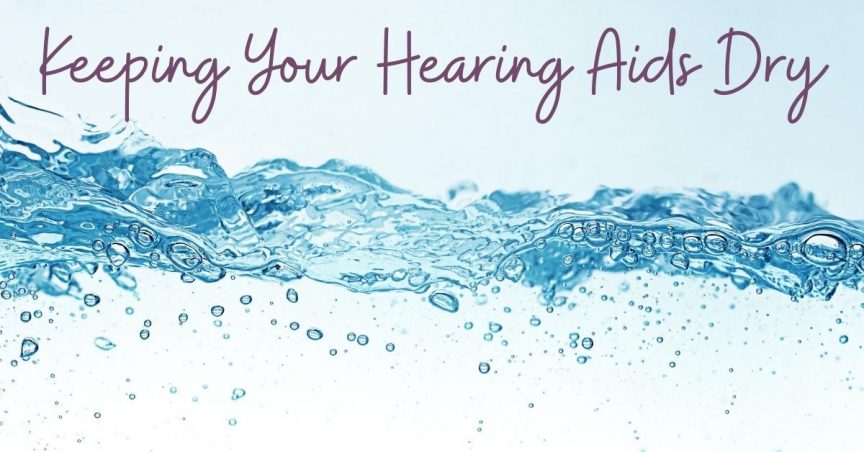- The Emotional Journey of Accepting Hearing Loss - October 25, 2024
- Making a Style Statement with Hearing Aids This Fall - October 15, 2024
- Fireplace Safety and Hearing aids - October 4, 2024
Have you ever accidentally stepped into the shower without taking out your hearing aids? We’ve all been there. It can be hard to keep your hearing aids dry, and sometimes a shower or a rainstorm can get your hearing aids wet. Keeping your hearing aids dry will help you maintain your hearing aids, so read these tips on keeping your hearing aids dry.
What Happens When Your Hearing Aids Get Wet?
Hearing aids and moisture don’t mix. Hearing aids are electronic, just like your phone or your computer. When electronics get wet they don’t work as well, or can have some glitches. When your hearing aids get wet, you may notice some corrosion of the metal pieces and your hearing aids may lose some power. Not only does the water harm your devices, any impurities or other particles in the water can damage your devices and shorten the life of your hearing aids.
Cleaning and Drying Your Hearing Aids
What would you do if you got your phone wet? You’d rush to dry it off as soon as possible. In the same way, if your hearing aids get wet you should dry them immediately. Hearing aids do have a moisture resistant coating, but you also need to take care of your devices. You should get into the habit of cleaning and drying your hearing aids every day. This will remove any dirt, dust, earwax, sweat, or moisture that can accumulate on your devices.
These are the steps to cleaning your hearing aids:
- Wipe the outside of your hearing aids with a soft, dry cloth
- You can remove any dirt or earwax from the hearing aid ports with a cleaning pick
- Open the battery door and wipe the inside of your devices with the cloth
- Leave the battery door open overnight so it can dry
After you’ve cleaned your hearing aids, place the hearing aids in a safe place overnight. This should be out of reach of any pets or children. We also recommend storing your hearing aids outside of the bathroom, since the bathroom is the most humid room in the house.
Get a Hearing Aid Dryer
Hearing aid dryers are a great way to make sure your hearing aids get thoroughly dried out every night. If you live in a humid city, a hearing aid dryer can extend the life and power of your hearing aids. Most hearing aid dryers use warm air to completely dry your hearing aids. This can take anywhere from one to six hours, depending on the drier. There are also dryers that use UV light to dry your hearing aids. These will both dry and sanitize your devices.
Hearing aid dryers are a great addition to your hearing aid care routine. After your wipe and clean your hearing aids, you can set them into the dryer overnight. When you put them on again in the morning your devices will be completely dry. Driers can also be a lifesaver if you’ve been caught in the rain or stepped into the shower. The drier will remove all the moisture from your hearing aids as quickly as possible and prevent water damage.
Wear a Hearing Aid Sleeve
If your hearing aids are exposed to a lot of moisture during certain activities, you can wear a hearing aid sleeve to keep them dry. For example, when you exercise, play sports, or go for a walk on a rainy day, your hearing aids can be exposed to moisture. You can protect your hearing aids by putting them in a hearing aid sleeve. You’ll still be able to hear clearly, and you won’t need to stress about getting your hearing aids wet.
How to Maintain Your Hearing Aids
Along with regular cleaning and drying, you’ll need to maintain your hearing aids to enjoy clear hearing. If you wear a Behind-the-Ear or Receiver-in-Canal device, you will occasionally need to replace the tubes or wires. You will also want a hearing health specialist to do a thorough cleaning and checkup every few months to make sure your hearing aids are giving you the best hearing. Maintaining your hearing aids by drying and cleaning your devices will extend the life of your devices and provide great hearing.

